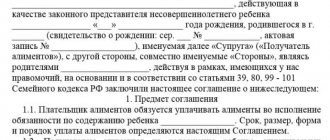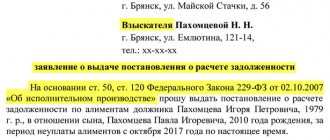If a parent obligated to pay child support has ceased to fulfill his obligations, then bailiffs are involved in collecting the debt. To repay the debt, enforcement proceedings are opened, and various types of sanctions are applied to the debtor. However, what should the recipient of alimony do if the debtor has died? Let's talk.
- Are alimony debts inherited? Review of judicial practice
- How to recover alimony penalties from heirs
- Required documents
The article also addresses the following frequently asked questions:
- What to do if the inheritance is less than the alimony debt?
- Is it necessary to pay the child support debt after the death of the child for whom the funds were collected?
If the alimony debtor dies, who pays the debt?
According to the provisions of Article No. 120 of the Family Code of the Russian Federation, obligations to pay alimony terminate with the death of the payer or recipient. But if the deceased did not make alimony payments regularly, and this led to the appearance of debt, the obligation to repay it passes to his heirs. In accordance with the law, persons who enter into inheritance rights to the property of the testator also inherit his financial obligations.
Important! The amount of alimony debt is distributed among all heirs of the alimony provider in the same shares in which they inherit his property.
Thus, alimony arrears after the death of the debtor are paid by the persons who inherit his obligation to pay the debt.
Can successors refuse inheritance?
The law does not oblige relatives to inherit. Each person decides independently whether he needs the property and debts of the testator.
There are two types of renunciation of inheritance. It is enough for assignees not to take any action for six months or to submit a written application to a notary.
Targeted refusal according to Art. 1158 of the Civil Code of the Russian Federation is carried out only by submitting an application. The heir must submit a waiver application within six months.
If the priority heirs refuse the property or do not accept it, then it passes to the relatives of the next priority. The ultimate legal successor is the state. The creditor may present his claims to the heir of the corresponding queue.
What is legally included in the inheritance?
If a child support debtor dies, who pays the debt is a question that is not always easy to sort out. Laws regulating inheritance rights are part of the Civil Code of the Russian Federation. The composition of the inheritance, according to the Civil Code of the Russian Federation, includes the following categories:
- things of the testator (personal items, cash and non-cash money, securities, etc.);
- property rights (ownership of real estate, a car and other property that the testator owned on the basis of title documents);
- intellectual rights;
- obligations related to property.
In other words, only that which is not related to the personality of the testator can be inherited. Accordingly, it is impossible to inherit a pension, compensation payments, benefits, allowances and other rights to which only the testator himself could be entitled. Alimony is also not inherited. But the debts do not belong to his personality, therefore they are inherited in the same way as, for example, the debts of the borrower under credit obligations.
Obligations of heirs
Based on the above, it is obvious that, upon accepting the inheritance, the legal successors of the alimony are obliged to pay all his debts, including alimony arrears. However, the payment procedure in each individual case is considered by the court individually based on the specific situation - depending on the amount of debt, the number of heirs and based on the composition of the inheritance mass.
The alimony debt can be repaid from the personal funds of the testator or from the proceeds from the sale of his apartment or other real estate, securities and other property.
Important! If the only heir of the deceased payer is a child - the recipient of alimony, then the debt is canceled, since he inherits all the payer’s property. In this case, it makes sense to apply for a survivor's pension.
Where to go to collect alimony debt
If the alimony holder dies, leaving debts on alimony payments, they can be collected in court by contacting the bailiff who is conducting the paperwork. Despite the termination of child support payments due to death, debts for non-payment continue to accumulate even after the payer has passed away. Therefore, in order to avoid complications during the proceedings, the bailiff should be notified first.
Having notified the bailiff about the death of the payer, you need to draw up and submit to him an application, which should reflect the calculations for alimony payments. The bailiff must issue a certificate with calculations, from which the amount of alimony debt is visible. This document serves as confirmation of the existence of the debt and the basis for its collection in court.
After completing these steps, a statement of claim is submitted to the court to collect arrears of alimony that arose during the life of the defaulter.
Rubric “Question/Answer”
My father paid alimony according to our verbal agreement with him. I didn’t go to court, I don’t have a writ of execution on hand. Can I count on repayment of the debt after the death of the alimony payer?
Expert opinion
Semyon Frolov
Lawyer. 7 years of experience. Specialization: family, inheritance, housing law.
Alas, this is impossible. The court needs proof of payment of alimony. If you agreed with the deceased orally, without drawing up writs of execution, you cannot demand payment of alimony debt from the heirs. It's simple - debt accumulates in case of non-payment and only in the presence of a writ of execution . This may be a writ of execution (IL), a voluntary agreement with the father, or a court order. Other ways to prove the fact of payment of alimony will lead nowhere. Naturally, you can try to come to an agreement with the heirs. But will they agree?
Is it possible to collect alimony debt after the death of the payer if 6 years have passed since the children came of age?
Expert opinion
Dmitry Nosikov
Lawyer. Specialization: family and housing law.
The legislation protects the rights of children, therefore, even in the event of the death of the obligated person, he retains the alimony debt. If a child is 24 years old, this does not mean that he will not receive child support. The child himself can become the claimant . He needs to find out who accepted the payer’s inheritance and contact these persons. It may be possible to agree on voluntary repayment of alimony debt. If not, the issue remains to be resolved in court. It is important that the plaintiff has an executive document, for example, an agreement or a court order. Then the bailiffs will be able to calculate the amount of the debt, and then the court will oblige the heirs to repay the debt within the inherited property. I would like to note that there is positive court practice in such matters. For example, Determination of the Judicial Collegium for Civil Cases of the Supreme Court of the Russian Federation dated 03/01/2016 N 45-КГ16-1
From what funds is the alimony debt passed along with the inheritance withheld? And do bailiffs have the right to withhold pensions and wages from the debtor’s heirs?
Expert opinion
Semyon Frolov
Lawyer. 7 years of experience. Specialization: family, inheritance, housing law.
Heirs who enter into an inheritance also assume obligations for the debts of the deceased person. If the inheritance includes an apartment or a garage, they cannot be seized. But you can foreclose on bank accounts (including where pensions or salaries are transferred). Collection takes place in court. If the plaintiff wins the case, the court issues a ruling in the form of a writ of execution. Next, the plaintiff takes it to the Bailiff Service, where enforcement proceedings are initiated. Based on the writ of execution, the amount will be withheld for alimony arrears. The heirs will be given a period to repay the debt. If there are no payments by this date, and the debt remains, the bailiff has the right to seize the salary and other income of the payers (Article 98 No. 229 of the Federal Law “On Enforcement Proceedings”).
Tips for heirs:
- Try to come to an agreement with the claimant (the child’s mother). Draw up a convenient payment schedule, enter into an agreement to repay the debt in equal monthly payments - in this way, the heir will be able to repay the debt within his share.
- Apply to the court for an installment plan, taking into account income and expenses. The application is submitted to the court that heard the case regarding the collection of arrears of alimony. If you achieve what you want, you can pay off the debt in installments. The main advantage is that the bailiffs will not seize your pension or salary.
- Provide the bailiff with certificates of your pension and salary account - they cannot withhold more than 50%. The heirs have the right to the second half (clause 2 of article 99 of Federal Law No. 229).
If any difficulties arise, contact our website lawyers!
What will happen to the alimony debt if none of the father’s heirs has entered into the inheritance?
Expert opinion
Dmitry Nosikov
Lawyer. Specialization: family and housing law.
The property of the testator, not accepted by anyone, will be considered escheated . This means that it will go to the state - or rather to the ownership of a municipal entity (city or district) - by virtue of Art. 1151 Civil Code of the Russian Federation. If the mother of a child files a lawsuit to collect arrears of alimony, she needs to correctly indicate the defendant's side. In this case, the defendant will be the city or district administration . Information about the subject can be found on the official website of the city or town hall. The collection procedure does not differ from that described in the article. Alimony is withheld against the inherited share of the father's property.
So, death stops further payment of funds, since alimony obligations are directly related to the personalities of the parties. But the death of the payer does not relieve the debtor’s legal successors from paying the debt incurred during his lifetime. This debt is paid from the inherited property that has become the property of the debtor's heirs.
If you need to collect alimony debt, and the payer has already died, do not delay this matter. Such disputes are difficult. The collector turns to the bailiffs/counts the debt himself, looks for heirs, meets with them, tries to come to an agreement, collects documents, identifies the defendant, files a claim, participates in the trial... and then controls the payment of the debt. And the heirs are trying to defend their rights. Acting alone is very difficult. Especially if you don’t know the algorithm of actions. To avoid mistakes, calculate debt, and prepare for court, consult a lawyer. He will guide you in the right direction, assess the risks and prospects of the business.
Watch a video about how alimony debts are inherited after the death of the payer:
Attention!
- Due to frequent changes in legislation, information sometimes becomes outdated faster than we can update it on the website.
- All cases are very individual and depend on many factors. Basic information does not guarantee a solution to your specific problems.
That's why FREE expert consultants work for you around the clock!
- via the form (below), or via online chat
- Call the hotline:
- Moscow and the Region
- St. Petersburg and region
- FREE for a lawyer!
By submitting data you agree to the Consent to PD Processing, PD Processing Policy and User Agreement.
Anonymously
Information about you will not be disclosed
Fast
Fill out the form and a lawyer will contact you within 5 minutes
Tell your friends
Rate ( 2 ratings, average: 5.00 out of 5)
Author of the article
Irina Garmash
Family law consultant.
Author's rating
Articles written
612
Procedure for going to court
Before going to court, you need to make sure whether alimony debts are inherited by anyone. In other words, does the payer have other heirs besides the recipient. If they exist, it is necessary to draw up a statement of claim for the collection of debt obligations, attaching documents confirming the existence of the debt.
Important! When considering a case in court, the plaintiff’s task is to declare a debt, and evidence of its absence is the responsibility of the defendant.
What documents should be provided to the court?
When filing a claim, it is important to understand the issue of collection as deeply as possible. It is worth considering that familiarization with the collection procedure and the legislative framework always makes sense, but cannot serve as a guarantee of a positive outcome of the case. Therefore, if there is insufficient awareness and taking into account that the court makes a decision on each case on an individual basis, it makes sense to seek advice from lawyers specializing in family and civil law.
If you want to resolve the issue yourself, it is important to approach the issue of debt confirmation as carefully as possible.
Documents confirming the recipient's right to recovery are:
- A notarial agreement (in case of a voluntary agreement between the parties) or a court decision on the payment of alimony.
- Documents from the case conducted by the bailiff regarding the collection of alimony - about the amounts, methods and regularity of payments.
- Confirmation of receipt of alimony amounts by the claimant (account statements, written receipts, etc.).
- Child support payment schedule.
- Other documents relating to the history of payment of alimony amounts.
How to achieve debt repayment?
First of all, having learned about the death of the parent paying child support, it is necessary to convey the sad news to the bailiff. The person's death certificate must be provided as proof. In connection with the discovered circumstances, the bailiff calculates the amount of the debt and issues a certificate to the representative of the child to whose address alimony was paid. This certificate will subsequently need to be attached to the claim.
A statement of claim is filed in court according to the general rules set out in civil law (read more about how to file a statement of claim in court). Since there is a dispute in the case, documents should be filed directly in the district court. Magistrates are not competent in this matter. All heirs of the deceased paying parent must be registered as defendants in the claim. It is they who will be proportionately responsible for the accumulated debts, within the limits of the received shares of the inheritance mass.
In addition to a certificate from the bailiffs about the amount of debt, the following must be attached to the claim:
- documents on the identity of the child’s representative and the child himself (passports, birth certificates);
- death certificate of the child support parent;
- performance list.
During the proceedings in court, the heirs, who are also the defendants, will prove that the deceased testator has no debt, while the plaintiff only needs to submit to the judge’s attention a certificate from the bailiffs, thereby documenting the existence of the debt.
Features of judicial consideration of a dispute
When considering a case of arrears of alimony, the court relies on the following legal framework:
- Article 1102 of the Civil Code of the Russian Federation, according to which the fact of illegal enrichment of the payer at the expense of unpaid alimony is established;
- Articles 1110, 1112 and 1175 of the Civil Code of the Russian Federation;
- arbitrage practice.
In addition, court decisions or a notarial agreement on the payment of alimony payments, documents on the opening of enforcement proceedings and a certificate with calculations of the payer’s debt are taken into account.
Payment of alimony
After the birth of a child, the parents are entrusted with the responsibility for his upbringing and maintenance (Article 80 of the Civil Code of the Russian Federation). Such questions usually do not arise in families. Each parent performs their responsibilities voluntarily.
The issue of forced child support usually arises upon divorce. It is not always possible for parents to agree among themselves on the amount and procedure for transferring it.
Go to court with a claim for the recovery of alimony in accordance with Art. 106 of the RF IC, the mother has the right if the man refuses to voluntarily fulfill the obligation. In case of refusal to execute the court decision, the woman has the right to appeal to the FSSP.
Bailiffs open enforcement proceedings. After which the forced collection of alimony from the second parent begins.
Cash payments must be made monthly. Otherwise, bailiffs can seize bank accounts and property of the debtor and sell it to pay off the debt.
The obligation to support a child is valid until the age of 18 (Article 120 of the RF IC). Sometimes the period of detention can be increased to 23 years. For example, if the child is a full-time student at a university.
Child support, according to Government Decree No. 841 of 1996, is withheld from the vast majority of income. The exceptions are:
- financial assistance for a wedding, funeral, birth of a child;
- business trips;
- compensation for medical nutrition;
- compensation for the use of personal tools for work purposes.
Arbitrage practice
Despite the fairly transparent collection procedure, cases from judicial practice are often quite complex. Often, plaintiffs try to collect not only the amount of debt, but also oblige defendants to make regular alimony payments, which is illegal. Equally frequent are cases where defendants appeal a court decision due to insufficient evidence of a debt or full satisfaction of the claim.
It is important to understand that the court makes a decision on the basis of current legislation, and any attempts to delay the decision do not work in favor of both parties: for the defendant - due to the growing debt, for the plaintiff - due to the delay in the moment of collection.
It must be taken into account that the court's decision is based on the fact that from the moment of the death of the payer, his obligation to the recipient loses force, the debts of the testator are distributed among the heirs in proportion to their inheritance shares, and the fact of collection is carried out in the manner of claim proceedings.
Is it possible to collect alimony debt after the death of the claimant (mother or child)
Also, alimony recipients are often concerned about the issue of alimony debt after the death of the claimant. Here the law works the same way as in the matter of the death of the payer: the obligation tied to the identity of citizens is canceled after their death.
But it is necessary to understand: in the event of the death of the parent who is the recipient of child support, the obligation to pay child support remains. Legal proceedings on behalf of the claimant are terminated, but they must be started on behalf of another person who has assumed the role of guardian or trustee.
In the event of the death of a child in whose name alimony is collected, the obligation to pay it is canceled, regardless of whether the other parent who was the claimant is alive.
When will child support payments stop?
We know that parents are obliged to support their children financially until they enter adulthood. But the law also provides for early termination of relations. Let's consider the list of situations provided for in Art. 120 SK, in which the payment of alimony is terminated:
- Recipient's age of majority.
- Adoption of the applicant. In such cases, along with parental rights, the new parent assumes the responsibility of maintaining the minor offspring.
- Death of the recipient.
- Death of the defendant.
- Restoring lost performance. This rule can be applied in situations where a parent pays child support to a disabled adult child. When a person recovers and regains the ability to earn his own living, the parent is relieved of the obligation to pay child support.
- Cessation of need. We are talking about those situations where alimony was assigned to a needy spouse. Cessation of need in this case is grounds for termination of payments.
As we can see, paragraph three of the above list clearly defines that the death of the defendant is the basis for termination of alimony payments.










